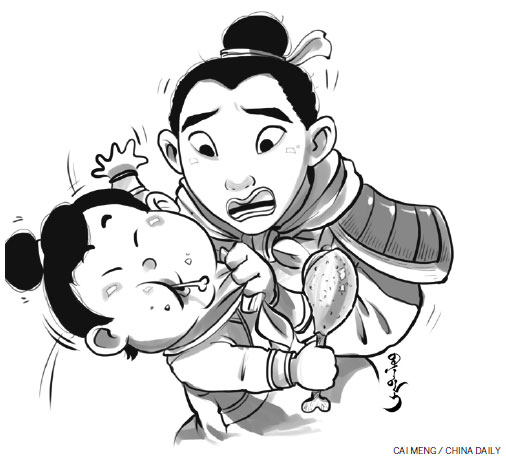
Comedian Jia Ling has rendered a public apology on her official Sina Weibo account, the country's twitter-like service, after an open letter criticized her for making fun of Hua Mulan, legendary Chinese female warrior, and portraying Mulan as an incompetent, cowardly woman in a TV show, which eventually raised a public storm. The letter, written by an institute specializing in Mulan-related studies, said Jia's show was "nauseating" and demanded she apologize to the people for her actions, especially to the residents of Yucheng in North China's Henan province, which claims to be Mulan's hometown.
But the majority of Chinese netizens seem to disagree with the criticism. According to a recent Sina online survey, 60 percent of the nearly 70,000 respondents said there was no need for Jia to apologize, because comedy shows are all about spoofs and exaggerations.
The story of Hua Mulan has its origin in an ancient folk song, Ode to Mulan, and her surname and birthplace are still uncertain despite the endless debates on them.
Putting aside the question whether Mulan really existed or not, people, especially those who cannot tolerate Jia's comedy show, should realize that comedy is first and foremost about parody and spoof. By exaggerating reality, a well-structured comedy program can be an excellent stress buster. So, as long as a comedy program does not cross the moral and legal bottom line, there is nothing to complain about it.
Jia's portrayal of Mulan is neither like the legendary heroine we have come to know through the Ode to Mulan in school textbooks nor like the character seen in Chinese TV dramas and the Disney animation. In contrast, Jia's Mulan appears much more worldly because it integrates current social phenomena such as gluttony and women who objectify men.
Moreover, Jia's recreation of Mulan's character reconciles with the original theme of the legend as she portrays the legend as a brave woman taking on the enemy. Viewed without prejudice, what could be more encouraging that seeing a cowardly and down-to-earth nobody become a brave warrior after undergoing army training and beating back intruders to protect her homeland?
Contrary to some righteous critics, it is absurd to assume that Jia chose Mulan to tarnish her legendary image or change the traditional perception about her. It is these critics' attempt to morally kidnap the issue and label Jia as a renegade just because she has tried to amuse the audience with a different Mulan that has irritated netizens, including those who might not have liked the show in the first place.
The image of Mulan and her heroic deeds are deeply rooted in Chinese people's mind thanks to bedtime stories and school textbooks, as well as the relatively orthodox versions of film and TV productions, which cannot be erased by Jia's sketch.
If people find Jia's show vulgar or offensive, they can easily choose to watch other more desirable TV programs, and those who see her spoof as interesting and entertaining can stick to the program.
Commercially speaking, the scriptwriters and actors cannot be blamed for recreating or reconstructing traditional culture and adding a little modern touch to cater to the audience's changing tastes.
Yet the emergence of overly exaggerated films and TV productions in recent years such as scenes showing a Chinese resistance fighter tearing a Japanese soldier in two with his bare hands in TV drama based on the War of Resistance Against Japanese Aggression (1937-45), it is understandable that some people fear such works could prompt the teenage audience to conceive history differently. Writers, therefore, should pay attention both to tradition and creativity so as not allow lampooning to spoil the classic tales.
The author is a writer with China Daily. xiaolixin@chinadaily.com.cn

I’ve lived in China for quite a considerable time including my graduate school years, travelled and worked in a few cities and still choose my destination taking into consideration the density of smog or PM2.5 particulate matter in the region.